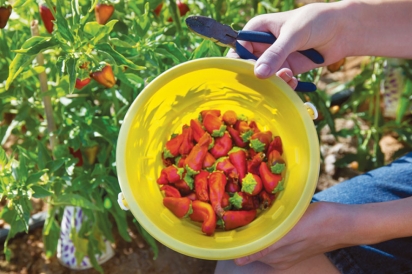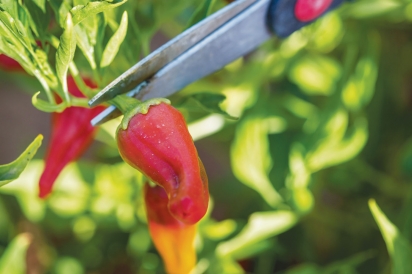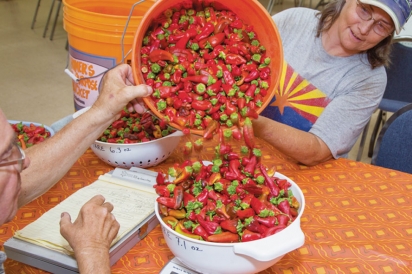Crazy Chile Farm: Effort adds spice to church’s outreach programs
Shirley Johnson’s and Janet Zuber’s fingers rhythmically slice in half red-orange peppers—some small and round like young strawberries, others shaped like a curly jalapeño. A few people crouch in the nearby chile field, cutting the scarlet pods from the leafy plants to drop into small plastic buckets.
This is a typical Monday morning at the Episcopal Church of the Transfiguration in Mesa, at least during harvest season for the 1,100 Chimayo chile plants outside the church buildings.
Now in its fourth year, the Crazy Chile Farm started as an effort to raise money for the church’s outreach programs, particularly one that provides meals through United Food Bank. A group of church leaders wanted to continue and expand those programs without continually asking parishioners for more money.
“We started looking into community gardens and the rate of failure is pretty high,” said Bill Robinson, the Crazy Chile Farm’s manager. “One of our guys said, ‘Hey, why don’t we work like a commercial farm and raise a commercial crop, sell it, and use the money to support the outreach programs?’”
The church now grows hundreds of pounds of Chimayo chiles, producing dozens of pounds of ground Chimayo chile pepper. After expenses, all the profits from the farm’s sales go to United Food Bank, Apache Junction Unified School District, Mesa Public Schools and emergency relief efforts, like communities hit by Hurricane Harvey in 2017.
“Most of the chile powder that’s sitting on a shelf in the grocery store is usually a chile mix. It’s got cumin in it and oregano and garlic and a bunch of other stuff,” Robinson said. You can find pure chile powder in grocery stores, he continued, but you don’t know how old it is and “it seems to be primarily geared for heat, rather than flavor.
“The Chimayo chile powder is a medium heat and it has a distinct flavor,” he said. “One of the things that is definitely noticeable is that there is a sweetness to it—not a sticky sweet, but definitely a sweetness you can taste.”
On trips to New Mexico, Robinson had loved the namesake peppers he ate around the town of Chimayo. When the church group found Chimayo chile seeds in Native Seed/SEARCH’s catalog, they connected with University of New Mexico’s Agricultural Science Center at Alcalde for advice on growing them a state farther west than where they usually grow.
“The village of Chimayo is almost at 6,000 feet and we’re at 1,600 here,” Robinson said. “We didn’t know if it would even work.”
“We ended up with a crop that [first] year that not only covered all of our start-up expenses, it gave us about $600 to $700 at the end of the year to start dumping into outreach programs,” Robinson said. The group had learned a lot by planting, growing and harvesting the first year’s crop, and in the second year brought in more profit from the 4,000-square-foot plot.
Last year, church members were excited about another prosperous chile season. The plants were doing well, Robinson said, and produced 36 pounds of chile peppers the third week of harvesting. The following week, though, Robinson and other volunteers returned to chile plants that seemed emaciated. Eventually, most of the plants dried up and died. Pathogens had built up in the ground and the fungal disease called verticillium wilt had taken hold in the plants, Robinson said. He blamed growing the peppers three years in a row in the same field.
Seeing firsthand the importance of rotating crops, the group established a second field to grow the chiles while the original plot now bears Yoeme blue corn. Volunteers will rotate the two crops every two years, Robinson said.
“We had to make a lot of adjustments, but we made it work,” Robinson said. “Our first year’s crop was puny compared to what we have now.” This summer, volunteers have been collecting between 50 and 80 pounds of chiles each week.
Those successes, though, have come from a lot of learning, persistence and figuring out decision making within a team of volunteers. The Rev. Robert Saik, rector of Episcopal Church of the Transfiguration, applauded the several people who have dedicated the time and energy to make the farm work.
“We’ve had a group of people, particularly Bill, who have really stuck with it regardless of what happens,” Saik said. “So, all along the way, just like many farmers, we’ve had plenty of issues. We’ve had issues with varmints, we’ve had issues with birds, we’ve had issues with water, we’ve had issues with diseases—that’s the biggest one. We’ve had questions about how we’re supposed to pick, how we’re supposed to process, how we’re supposed to sell, how we’re supposed to package. There have been issues with all that stuff, but each time somebody’s found an answer and we keep going.”
Crazy Chile Farm volunteers include mostly church members, but also others who heard about the project and wanted to help. Laura Ward started regularly coming to work with the chiles after Robinson contacted her about bringing her pair of draft horses to the church to plow and establish the church’s second field. The area, which had been a parking lot, was so compacted that the horse-drawn plow wasn’t able to turn the soil and a parishioner later rented a tractor to break ground. Ward has continued helping out in other ways, including bringing the Clydesdales to the annual Chile Pepper Harvest Festival.
Along with the chiles and the Yoeme blue corn, the church is growing brown tepary beans, Mexican oregano and some native varieties of squash and pumpkin. Seeds for those native types of corn and beans are very limited, Robinson explained, so the church partnered with Native Seeds/SEARCH and the Ajo Center for Sustainable Agriculture to help build up the supply.
By selectively saving seeds from the chiles year to year and as the plants adapt to their new environment over time, the church is creating a new landrace variety of the Chimayo chile, Robinson explained. The church has named its chiles “Campo Dorado,” meaning “gold field” in Spanish, in honor of the Goldfield Mountains just to the north of the church.
But how did the farm get its name?
Robinson described how, soon after the church’s vestry had decided to embark on the small farm project, several of the group were attending an annual conference for the Episcopalian church diocese. The final night of the conference, the bishop was speaking on the Biblical parable of the sower, where a man scatters seeds across a path, onto rocks, in thorns and some on good soil.
The bishop mentioned that his wife was from a farming community and that if anyone there would have been so careless with seed, people would have said they’re crazy. Robinson says the fellow parishioner sitting next to him elbowed him in the side and exclaimed, “We must be the crazy chile farm!”
Born into a farming family in northern Indiana, Marlys Weaver- Stoesz grew up as involved in growing and harvesting food as in eating it. Her passion for food and farming began on that small, heritage-breed dairy farm, but it has also taken her to harvesting coffee beans on a farm in Peru and working at natural food cooperatives and farmers markets. Marlys’ writing work focuses on agriculture and education. Learn more at marlysws.com.
Chile Pepper Harvest Festival
Pick up Crazy Chile Farm chile powder, compete in a cookoff and enjoy a horse-drawn wagon ride at the farm’s third annual Chile Pepper Harvest Festival on Saturday, Oct. 27, 2018.
The event is from 8am to 2pm at the Episcopal Church of the Transfiguration, 514 S. Mountain Rd., Mesa.
A variety of Crazy Chile Farm products and other area goods will be available at a farmers market during the festival. The day will also include live music, Clydesdale-drawn wagon rides, a freethrow shooting contest, a children’s art booth, tours of the farm and a chile cookoff.
The chile cookoff is open to anyone bringing a dish that features chile flavors. The winning entry will receive $100. Contact Gordon Noyes, the festival’s food management and chile cookoff coordinator, at 413-320-9323 for entry information.
